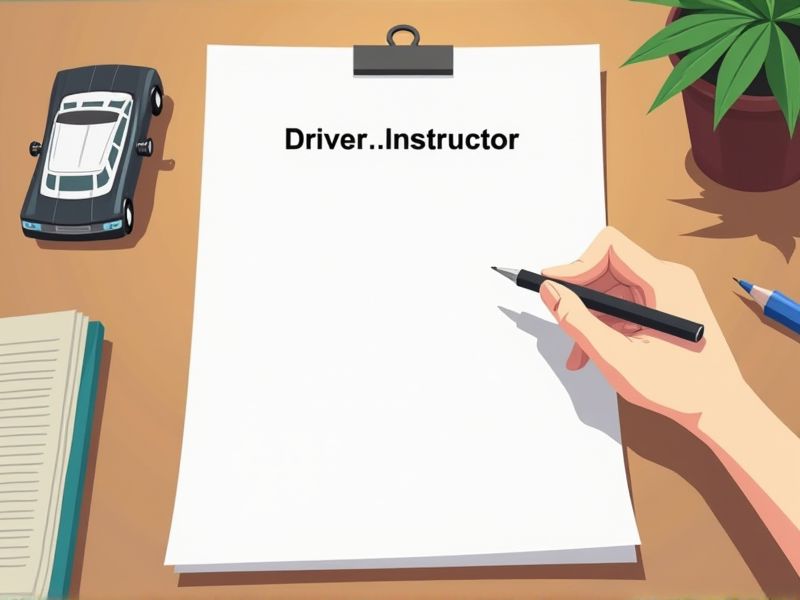
Driver instructors play a critical role in ensuring safe and responsible driving practices. Certifications validate their knowledge of traffic laws, student psychology, and vehicle mechanics. They also demonstrate a proven ability to teach effectively, ensuring students receive high-quality education. Here are some important certifications you may need as a driver instructor.
State Issued Driving Instructor License
A State Issued Driving Instructor License ensures that the instructor meets safety and educational standards set by regulatory authorities. It establishes a consistent curriculum and allows students statewide to receive standardized training. Holding this license requires instructors to be knowledgeable about traffic laws and defensive driving techniques, enhancing road safety. This credential also boosts public trust in the driving education system, encouraging more individuals to seek professional driving lessons.
Certified Driving Instructor (CDI) Credential
Obtaining the Certified Driving Instructor (CDI) credential ensures that a driving instructor has met standardized qualifications, which leads to increased trust from students and parents. Credentials facilitate a structured curriculum, resulting in better learning outcomes for new drivers. Certification often requires continuing education, ensuring that instructors stay updated with evolving traffic laws and teaching methods. Many insurance companies and driving schools mandate CDI credentialing, as it often reduces risk and liability.
Defensive Driving Instructor Certification
Defensive Driving Instructor Certification enhances a driver's ability to anticipate potential hazards, reducing the likelihood of accidents. Certified instructors are better equipped to teach students critical skills for safe driving, leading to improved road safety. This certification often results in higher credibility and trust from both learners and employers in the driving education industry. Insurance companies may offer discounts or incentives for schools employing certified instructors, as this certification aligns with preventive safety measures.
Commercial Driving Instructor Certification
Commercial Driving Instructor Certification ensures that instructors meet minimum safety standards and competence levels, reducing traffic incidents. The certification process provides instructors with up-to-date training on rules and regulations, increasing their teaching effectiveness. Employers and clients are more likely to trust certified instructors, which can influence job opportunities and client satisfaction. Certification can contribute to higher insurance compliance rates, benefiting both instructors and their students.
Advanced Driver Training Certification
Advanced Driver Training Certification ensures that driving instructors possess up-to-date knowledge of road safety regulations and modern vehicle technologies. This certification also enhances their teaching methods, enabling them to effectively convey critical driving skills to their students. Without such credentials, instructors may lack the necessary expertise to train drivers in increasingly complex traffic environments. Consequently, the certification contributes to a higher standard of driver education and reduces the risk of road accidents.
Certified Traffic Safety Educator
Certified Traffic Safety Educators enhance the credibility and quality of driver training programs by incorporating evidence-based strategies. When instructors possess this certification, they have a comprehensive understanding of the latest traffic laws and safety standards, which directly reduces accident risks. Their expertise ensures that students receive a well-rounded education focused on both theoretical knowledge and practical skills. As more drivers become educated under certified instructors, overall road safety improves, decreasing fatalities and injuries.
Comprehensive Driver Assessment Certification
Comprehensive Driver Assessment Certification ensures that driver instructors maintain up-to-date knowledge of traffic laws and safety regulations, enhancing instruction quality. Certification plays a crucial role in standardizing teaching methods, leading to safer driving practices among new drivers. Uncertified instructors might lack critical information, potentially compromising the safety of drivers and road users. Certified assessments help align instructors with current educational techniques, fostering consistent learning outcomes across different driving schools.
First Aid and CPR Certification
Driver instructors often encounter situations where accidents are possible, creating a potential need for first aid and CPR skills to address emergencies. Possessing certification ensures that instructors can quickly and effectively respond to health crises, potentially saving lives. With comprehensive training, instructors are better equipped to maintain a safe environment for students and other road users. Knowledge of first aid and CPR also boosts confidence among students, knowing their instructor is prepared for critical situations.
Hazard Perception Instructor Certification
Hazard Perception Instructor Certification enhances a driving instructor's ability to effectively teach new drivers how to identify and respond to potential road dangers. When instructors are properly trained, they can provide learners with crucial skills, potentially reducing accident rates. With more comprehensive knowledge, instructors contribute to producing more competent and safer drivers on the road. This certification ensures that instructors stay updated on the latest safety standards and technologies, reflecting current driving realities.
Teen Driver Safety Education Certification
Teen driver safety education certification is essential for driver instructors because it ensures they possess the necessary knowledge to teach safe driving practices tailored to inexperienced drivers. Certified instructors are better equipped to identify and address specific risks young drivers face, such as distracted driving and poor hazard perception. When instructors are certified, parents gain confidence in the quality and effectiveness of the driver training their teens receive. This certification can lead to a reduction in accidents involving teen drivers as it promotes consistent and high standards of instruction.
Summary
When you choose a driver instructor with certifications, you can expect a more structured and effective training experience. Certified instructors often have a deeper understanding of traffic laws and advanced teaching techniques. This can lead to faster progress in acquiring driving skills and increased confidence behind the wheel. The certification also indicates a commitment to upholding safety and educational standards, benefiting your learning outcomes.
